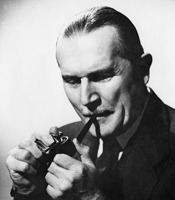Karl F. Meyer, D.V.M., Ph.D.

Brief Bio
Karl Friedrich Meyer (1884–1974) was the twenty-seventh president of the American Association of Immunologists, serving from 1940 to 1941. He was an active faculty member of the University of California for over 40 years, teaching at both the Berkeley (UC Berkeley) and San Francisco (UCSF) campuses and conducting pioneering research on animal and human diseases at the George Williams Hooper Foundation for Medical Research at UCSF.
Born in Basel, Switzerland, Meyer received his D.V.M. from the University of Zurich in 1909. He was a pathologist for the Transvaal Department of Agriculture in Onderstepoort, South Africa, under Arnold Theiler from 1908 to 1910 before returning to Switzerland, where he heard of an opening at the University of Pennsylvania (Penn). Meyer immigrated to the United States in 1910 to join the faculty of the School of Veterinary Medicine at Penn as an assistant professor. In 1911, after only one year of teaching, he was promoted to full professor and became the director of the Laboratory and Experimental Farm of the Pennsylvania Livestock Sanitary Board. He left Philadelphia in 1913 for Berkeley, where he joined Frederick P. Gay (AAI ’18, president 1921–22) in the Department of Pathology and Bacteriology at UC Berkeley as an associate professor of bacteriology and protozoology. Meyer rose to full professor the following year. In January 1915, he moved to San Francisco and became an associate professor of tropical medicine at the George Williams Hooper Foundation for Medical Research, the newly established research institute at UCSF, whose backers hoped it would become the Rockefeller Institute of the West Coast. Meyer was appointed acting director of the Hooper Foundation in 1921 and director in 1924, the same year that he received his Ph.D. in zoology from the University of Zurich while there on sabbatical. He also established Departments of Bacteriology at UC Berkeley and at the UCSF School of Medicine and chaired both departments from 1924 to 1948, when he became professor of experimental pathology. He retired in 1954, at the age of 70, and was named emeritus director of the Hooper Foundation and emeritus professor of experimental pathology at UCSF. He continued his research until his death in 1974, just weeks before his 90th birthday.
Lasker Award
1951 Albert Lasker Basic Medical Research Award “for bacteriological research in parasitology.”
Click here for more details.
Oral History - Full Interview
Karl F. Meyer oral history, "Medical research and public health," Regional Oral History Office, University of California, Berkeley
Karl F. Meyer Interview, American Society of Tropical Medicine and Hygiene
Oral History - Transcript
Click here to download the transcript of "Medical research and public health"
AAI Service History
Joined: 1922
President: 1940–1941
Councillor: 1939–1940, 1941–1950
The Journal of Immunology
Board of Editors: 1936–1942
Associate Editor: 1943–1947, 1958–1962
Editor: 1947–1949
Editorial Board: 1949–1957
Awards and Honors
- Fellow, American Academy of Arts and Sciences, 1935
- Member, National Academy of Sciences, 1940
- Sedgwick Memorial Medal, American Public Health Association, 1946
- Albert Lasker Basic Medical Research Award, 1951
- Walter Reed Medal, American Society of Tropical Medicine and Hygiene, 1956
- Jessie Stevenson Kovalenko Medal, National Academy of Sciences, 1961
Institutional/Biographical Links
- National Academy of Sciences biographical memoir
- “Karl F. Meyer: The Renaissance Immunologist,” AAI Newsletter
- University of California memoriam
- University of California, San Francisco, Library profile
- Karl F. Meyer Papers, University of California, Berkeley
- Karl F. Meyer Miscellaneous Papers, University of California, San Francisco
- “Karl F. Meyer: Plague and Botulism,” Bancroft Library Exhibit, University of California, Berkeley